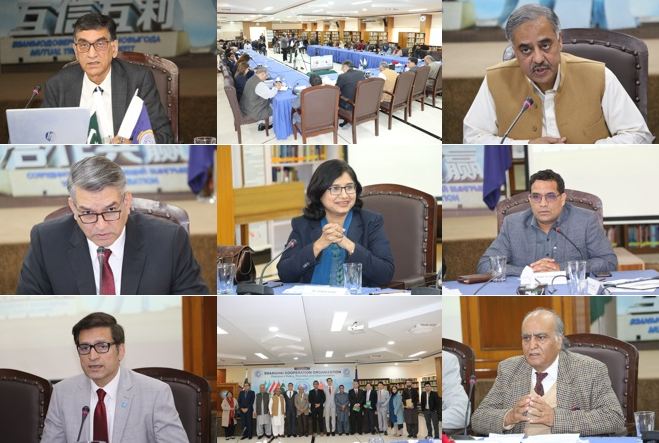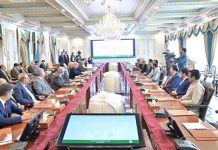ISLAMABAD, FEB 23 /DNA/ – China-Pakistan Study Centre (CPSC) at the Institute of Strategic Studies (ISSI) hosted a Roundtable, entitled “Shanghai Cooperation Organization: Pakistan’s Policy, Priorities and Opportunities.” Ambassador (R) Babar Amin, Pakistan’s first-ever National Coordinator for SCO, delivered a keynote address. Eminent discussants from academia and think-tanks presented their perspectives. The Roundtable provided valuable insights into Pakistan’s upcoming pivotal role in the SCO in the run-up to Council of Heads of Government (CHG) summit to be hosted by Pakistan as well as its vision for regional cooperation and economic integration.
In his welcome remarks, DG ISSI Ambassador Sohail Mahmood underscored the significance of SCO as a trans-regional platform. He highlighted the importance of SCO in contemporary global milieu, opportunities for Pakistan as the country prepares to take a leading role in the Organization, and the challenges that should be kept in view regarding SCO’s objectives and role in future. He highlighted that since its establishment in 2001, SCO has grown to become a ‘big family’ of 26 countries, including member states, observers and dialogue partners. He added that, commutatively, SCO accounts for 60% Eurasian landmass 40% of global population, and nearly 30% of global GDP. The Organization continues to carry the “Shanghai Spirit” of mutual trust, equality, respect for diversity and pursuit of common development, as opposed to any zero-sum perspectives or notions of geopolitical confrontation or civilizational clash.
Ambassador Sohail Mahmood further emphasized that Pakistan has considered SCO as an important platform from the outset and the country’s forthcoming responsibilities in various Councils as well as the apex decision-making body, the Council of Heads of State, entails important opportunities for advancing SCO’s objectives of regional peace and stability. It would be important for Pakistan to be both imaginative and proactive as its steers the various SCO meetings and Summit processes in 2024 and beyond. He concluded by highlighting the challenges that may confront the Organization in the form of diversity of member states, effects of major-power competition, and changing nature of security threats in the region, and called for careful resolution of such challenges with close consultations among the member countries.
Ambassador Babar Amin, in his keynote address, outlined Pakistan’s strategic objectives within the Organization. He highlighted Pakistan’s efforts to strengthen bilateral relations with Russia through the SCO platform and emphasized the importance of connectivity and infrastructure development, particularly in addressing energy crises. He noted that Pakistan can act as a natural partner with SCO for promoting connectivity, trade and economic cooperation in the region. The China Pakistan Economic Corridor (CPEC) aligns naturally with goals of SCO for regional connectivity and promotion of trade. Pakistan can also assist SCO member countries in the area of security cooperation due to its extensive counter-terrorism experience and collaboration with the RATS (Regional Anti Terrorism Structure) mechanism of SCO. Ambassador Babar Amin added that by actively participating in SCO meetings and initiatives, Pakistan aims to strengthen its historical ties with Central Asia and further solidify its comprehensive strategic cooperative partnership with China, he added.
Ambassador Babar Amin said that the key strategic priorities for Pakistan within the SCO include establishing itself as a credible partner, particularly in contrast to India’s selective engagement and perceived alignment with Western preferences. He said that Pakistan seeks to enhance non-traditional security cooperation through the RATS mechanism within the SCO, fostering collaboration on defense and security matters. Additionally, SCO platforms provide opportunities for constructive engagement with India, presenting avenues for future bilateral meetings and dialogue on the sidelines.
Dr. Liaqat Ali Shah, Executive Director of the Centre of Excellence for China-Pakistan Economic Corridor (CPEC), emphasized the multifaceted nature of SCO’s agenda, aligning with the Belt and Road Initiative (BRI). Dr. Shah stressed the potential for synergy between SCO and BRI, and in extension, with CPEC, is essential to promote regional integration. He also emphasized the need for inclusivity and multilateral participation in economic cooperation at the SCO forum. For this to better materialize from Pakistani side, there needs to be better coordination in policymaking and implementation.
Addressing the challenges and opportunities of financial integration within the SCO, Dr. Shazia Ghani, Senior Research Associate at the Grenoble Centre of Research on Economy, France, emphasized the importance of understanding the diverse economies of SCO member states and the necessity for exportable surplus to leverage economic potential effectively. She further added that it is the need of the hour at the SCO platform to discuss prospects of trading in regional currencies, like the Renminbi, as the shift to trading in other currencies now appears inevitable.
Prof. Dr. Syed Hussain Shaheed Soherwordi, Chairman of the Department of International Relations at the University of Peshawar, advocated for a redefinition of power relations within the SCO, stressing the primacy of economics over traditional security paradigms. He highlighted the need for enhanced economic relations with regional and neighboring states and emphasized the importance of strengthening regional connectivity. He added that multilateral platforms like SCO can facilitate dialogue and discussion among adversarial actors, allowing for easing security related concerns to allow greater trade and economic activity in the region.
Earlier, in his opening remarks, Director of China Pakistan Study Centre Dr. Talat Shabbir highlighted Pakistan’s upcoming assumption of the rotating annual chairs for the SCO’s governing bodies including the Council of Heads of Government, Council of Regional Anti-Terrorism Structure, and the Council for Heads of State. He emphasized that this opportunity symbolizes Pakistan’s commitment to promoting connectivity and combating terrorism regionally and globally, marking it a cornerstone for regional integration within the SCO framework.
In his concluding remarks, Ambassador Khalid Mahmood, Chairman of the Board of Governors at ISSI, underscored the dual focus of the SCO on economy and security, likening it to a cart with two wheels. He emphasized the importance of multilateralism in addressing contemporary challenges and urged the SCO to embark on non-traditional projects to foster regional cooperation and development.












